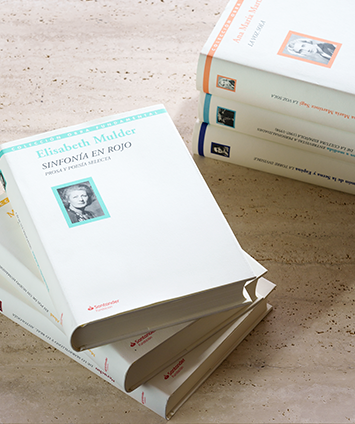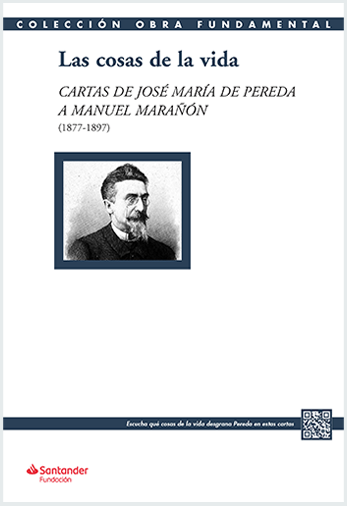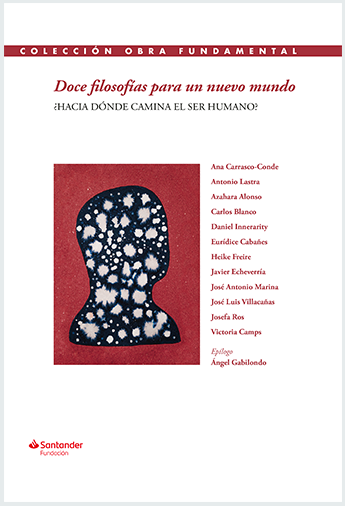


Colección Obra Fundamental
Fundación Banco Santander retrieves forgotten works by Spanish-language authors from late nineteenth and early twentieth centuries by publishing the Colección Obra Fundamental.
After the COVID-19 pandemic and the subsequent health crisis, the collection was expanded to include contemporary literature, with the aim of creating a space in which to reflect on the societal and individual transformations of our time. This decision resulted in the publication of a trilogy of short stories, poems and philosophical essays. The final volume, featuring texts by twelve representatives of the contemporary philosophical panorama, was published in 2024.
All of the titles in the collection are also released as e-books and, starting in 2021, accompanied by podcasts that can be found on the foundation’s website and the main platforms. These podcasts contain interviews with the authors or anthologists and dramatisations or readings of some of their texts.
José María de Pereda
This volume is a compilation of more than 260 letters which Pereda, one of the great Spanish authors of the second half of the nineteenth century, wrote to the lawyer Manuel Marañón. In addition to personal matters, the missives provide numerous insights into the writer’s profession at that time and allow us to follow the process of literary creation from start to finish.
Jaime Olmedo, who edited the correspondence and wrote the introduction, is a lecturer in Spanish Literature at the Complutense University, a corresponding member of the Royal Academy of History and vice-chancellor of the Camilo José Cela University.
The podcasts accompanying the book feature an interview with Jaime Olmedo and readings of excerpts from some of the letters contained in the volume.

¿Hacia dónde camina el ser humano? Multiple authors
The final volume in the contemporary literature trilogy is a compilation of essays about the changes that the future has in store, written specifically for this book by twelve philosophers.
Ana Carrasco-Conde, Antonio Lastra, Azahara Alonso, Carlos Blanco, Daniel Innerarity, Eurídice Cabañes, Heike Freire, Javier Echeverría, José Antonio Marina, Josefa Ros, José Luis Villacañas and Victoria Camps propose, among other things, that we change our destructive relationship with nature, move past a gruelling labour system, and make life meaningful by caring for others. Ángel Gabilondo concludes their reflections with an epilogue.
The podcasts contain conversations with the featured philosophers and readings of their texts.

Gaziel
This notebook reveals the least-known facet of Gaziel, the pseudonym used by journalist and writer Agustí Calvet i Pascual, a reputed war correspondent during World War I and political analyst in the days of the Second Spanish Republic. The volume contains selected articles of literary and art criticism. Shakespeare, Gaudí, Goya, Proust, Goethe, Cervantes, Baroja and Dostoevsky are just some of his subjects.
Francisco Fuster, associate professor of Contemporary History at the University of Valencia and expert on the history of Spanish Silver Age culture, prefaced and selected the texts.
The publication is rounded out by nine podcasts—an interview with Francisco Fuster and eight narrated pláticas or “chats”—and a video, posted on the foundation’s YouTube channel, in which the anthologist and Jordi Amat talk about Gaziel.

CartasVivas
Fundación Banco Santander and the University of Exeter launched this audiovisual library in 2019 with the intention of highlighting the role which different women played in twentieth-century Spanish and Latin American cultural circles through their own testimonies. These take the form of short film pieces directed by Nuria Capdevila-Argüelles, professor in Hispanic Studies and Gender Studies. Students from the University of Exeter also participated in their production.
In 2024, three new CartasVivas or “living letters” were filmed about the Spanish painters Amalia Avia, Teresa Sánchez-Gavito and Delhy Tejero, played by the actresses Paula Rodríguez, Elena Sanz and Sofía Monreal, respectively. The scripts were based on the artists’ own diaries and memoirs.
All of the shorts made since the start of the project are freely accessible on the website cartasvivas.org.


